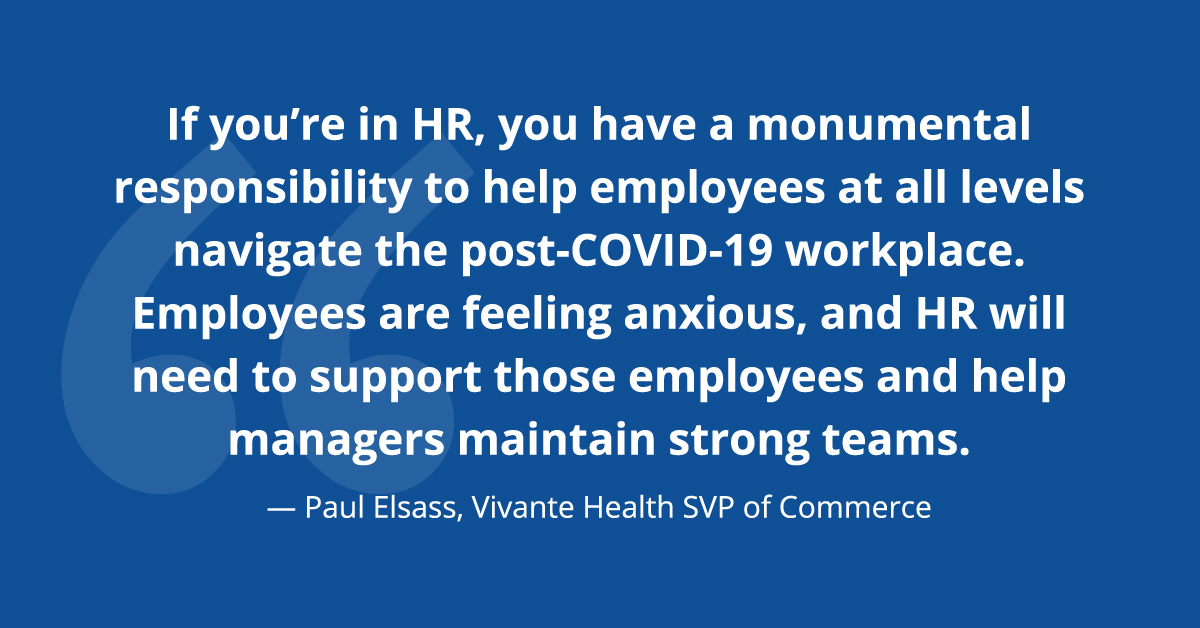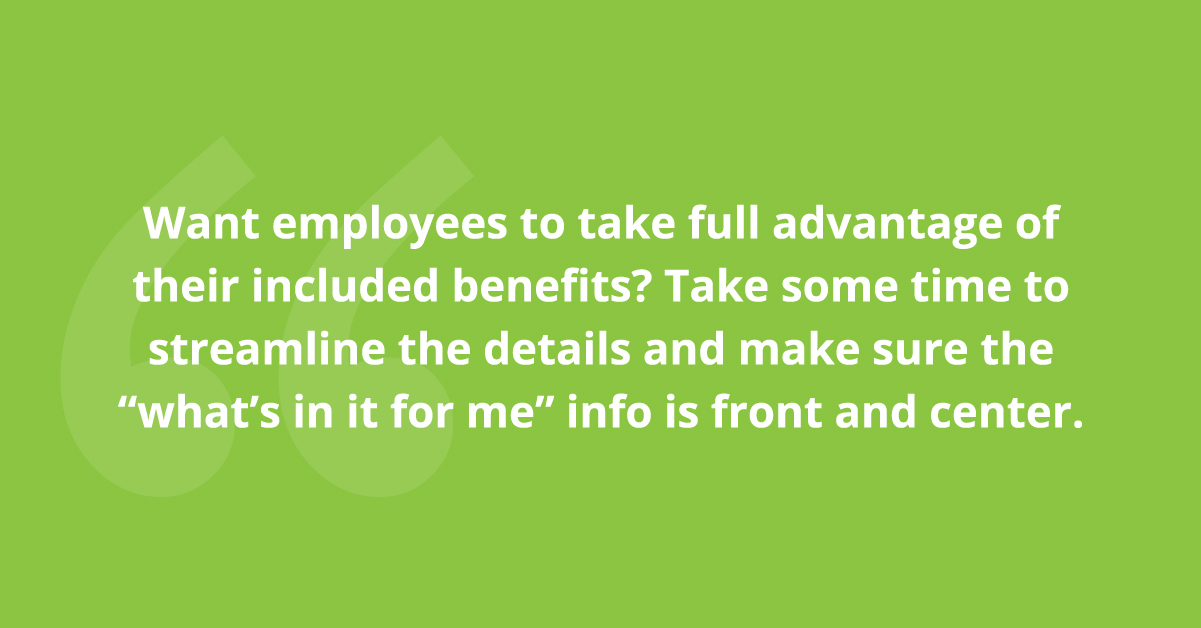Every single working person right now has been impacted in some way by the COVID-19 crisis. Business as we know it had to change overnight. Unfortunately, millions lost jobs or saw big drops in working hours and/or pay rates. And for those who still held onto jobs, the strain of ever-pivoting quarterly goals and constrained budgets created a whole new set of concerns few of us could have foreseen back in January 2020.
For human resources executives and managers, the responsibility of employee management has been full of challenges right from the start of this crisis. Paul Elsass, SVP of Commerce for Vivante has met with several HR departments over the past couple months. Based on those conversations, he says HR is dealing with how to support and guide employees in uncertain waters.
“If you’re in HR, you have a monumental responsibility to help employees at all levels navigate the post-COVID-19 workplace. Employees are feeling anxious, and HR will need to support those employees and help managers maintain strong teams,” says Elsass.
Here are five ways HR managers can equip themselves to have employees’ backs in these uncertain times.
New Priorities and Metrics
First and foremost, we know you need the latest information to inform new policies or changes your company may need to consider. Here at Vivante, we’ve been looking for the latest news and information regarding how the HR function is impacted in our newly-transformed work world. Human Resource Executive is a great resource to track best practices and case studies. Check out the daily updates to its Strategies to manage coronavirus in the workplace collection, which touches on everything from benefits/compensation issues to how to create agile telecommuting policies.
As you work to pivot toward recovery, a few key HR metrics can help make sure nothing gets lost in the fast-pace of ramping business back up. For some helpful ideas—like making sure you have alternate contact info on-hand for each employee— check out Paylocity’s Top HR Metrics to Track During COVID-19.
Flexible and Fair Expectations
Performance reviews might look a little different in 2020. Employees had to quickly adjust to working from home, taking on additional duties or working with hastily-revised quarterly goals. Under such unusual circumstances, HR will also need to adjust expectations and find ways to reframe the usual metrics.

As stated in this post by Canadian HR solutions provider Rise, “When considering how to evaluate an employee for their annual review, give significant weight to their pre-pandemic job performance. You have the advantage of past knowledge. You’re not evaluating a new remote employee—just a newly remote one—and you’re already familiar with their work habits, their typical productivity levels and their degree of engagement.”
Even if performance reviews don’t occur until Q4, meet with team leaders and supervisors as soon as possible to reframe the review process so expectations can be communicated early. Be respectful of employees’ anxieties and concerns by explaining any updates or changes to how they will be reviewed. In some cases, hard-hit companies may even decide to forgo formal reviews this year in favor of ongoing check-ins with supervisors and periodic incentives as the company begins to recover. Whatever the case, make sure employees are kept informed.
A Focus on Holistic Well-Being
As people transition to whatever “the new normal” might look like in terms of our work habits and conditions, there will likely be some unforeseen challenges ahead. Several factors could come into play regarding how comfortable each employee feels moving forward. There could be physical, emotional and/or mental stressors impacting productivity, sense of security, and creativity.
Stress plays a big role in performance, as well as mental and physical health. In fact, we’re hosting a free webinar on May 27 webinar, 5 Strategies to Take Control of Stress. Join to get some tips to help yourself and your team members diffuse stress.
Even before COVID-19, several organizations began to take a more holistic approach to employee well-being. For instance, PwC built an engagement platform for employees to offer actions and habits that could improve their overall sense of well-being called the Be well, work well Habit Bank. On this site, anyone can navigate around to the four sections (physical, mental, emotional and spiritual) to get ideas for everyday actions to help feel better on either an individual or team level.
While not every company can build out a feature like PwC’s Habit Bank, the idea behind it is powerful: consider the whole employee and what they need on multiple levels in a time like this.
Adapt your own holistic, well-being approach to enhance your overall culture. It’ll remind employees that you do see and respect them as complex human beings, first and foremost. In such an emotionally-charged time, this kind of consideration can go a long way.
Trust and Appreciation
Employees want to feel like they’re valuable. Each of us wants to know our contributions are noticed and appreciated. Appreciation was already a topic growing in importance before the pandemic, and going forward it’s likely to be just as relevant.
After all, it’s no secret that companies who treat employee appreciation as a core value rather than a “nice to have” attribute tend to have higher retention and loyalty rates. If you already have an employee recognition program, that’s great. And if not, this is the perfect time to start one!
As we move toward and businesses of all kinds begin the recovery process by developing new workforce norms, chances are there’ll be some inevitable growing pains. Employees and managers alike will have a number of new challenges, expectations and goals to work with. It may test the bonds of even the strongest companies.
Right now, demonstrating genuine appreciation for the work being done will go a long way toward building camaraderie and a strong sense of “we’re in this together.”
Strong, Comprehensive Benefits
Finally, employees want to know their benefits are strong and will provide resources to help them get through life’s challenges—now and in the uncertain future. Reinforce the health benefits and insurance options available to your employees.
Remember to make these communications easy to understand. To many employees, benefits communications can be confusing or complex. According to personalized health and benefits solutions provider (and Vivante Health partner) Accolade, it’s super important for HR to make key points as clear and transparent as possible in employee communication efforts.
Want employees to take full advantage of their included benefits? Take some time to streamline the details and make sure the “what’s in it for me” info is front and center. Consider making a quick “refresher” memo to remind employees of some of the options—like telemed appointments with medical providers, or mental health counseling—they might have overlooked back before COVID-19.

And of course, offering additional benefits beyond the standard medical and dental can boost retention and help draw in brand-new talent. In HR Strategies for a Post-COVID-19 Workplace, human resources director Maria Clyde shares a few perspectives for HR to consider implementing, such as personalized benefits and options and prioritizing wellness and workplace flexibility.
Personalized benefits points solutions, like Livongo (diabetes management) and GIThrive® (digestive disease management), can be great retention/recruitment tools because they offer employees individualized support to manage chronic or painful conditions. In addition, they can help lower healthcare costs and help boost employee productivity since conditions like Crohn’s, colitis and IBD can be debilitating and hard to cope with on a regular basis. But with digital health support provided by their employers, employees can feel more comfortable both in and out of work.
It’s All About Taking Care of Humans
Overall, meeting employees where they are at the moment is what’s important. If it helps, consider doing an informal survey to gauge what they most need right now and what HR can offer to help provide support.
Taking care of the humans during—and after—a human crisis is an important responsibility. On behalf of Vivante, we want to thank our HR colleagues for being the superheroes you are!







